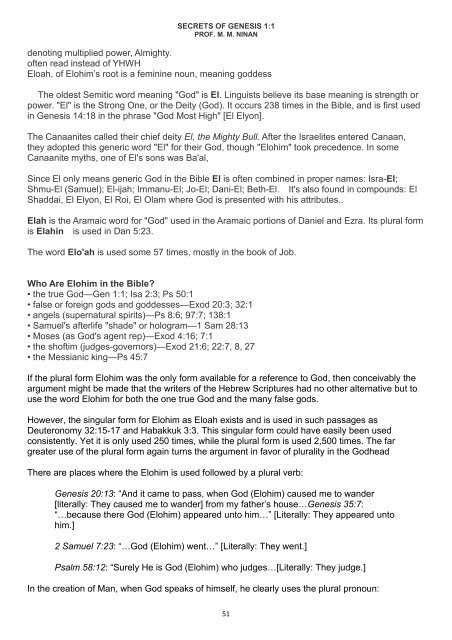Secrets of Gen 1.1
You also want an ePaper? Increase the reach of your titles
YUMPU automatically turns print PDFs into web optimized ePapers that Google loves.
SECRETS OF GENESIS 1:1<br />
PROF. M. M. NINAN<br />
denoting multiplied power, Almighty.<br />
<strong>of</strong>ten read instead <strong>of</strong> YHWH<br />
Eloah, <strong>of</strong> Elohim’s root is a feminine noun, meaning goddess<br />
The oldest Semitic word meaning "God" is El. Linguists believe its base meaning is strength or<br />
power. "El" is the Strong One, or the Deity (God). It occurs 238 times in the Bible, and is first used<br />
in <strong>Gen</strong>esis 14:18 in the phrase "God Most High" [El Elyon].<br />
The Canaanites called their chief deity El, the Mighty Bull. After the Israelites entered Canaan,<br />
they adopted this generic word "El" for their God, though "Elohim" took precedence. In some<br />
Canaanite myths, one <strong>of</strong> El's sons was Ba'al,<br />
Since El only means generic God in the Bible El is <strong>of</strong>ten combined in proper names: Isra-El;<br />
Shmu-El (Samuel); El-ijah; Immanu-El; Jo-El; Dani-El; Beth-El. It's also found in compounds: El<br />
Shaddai, El Elyon, El Roi, El Olam where God is presented with his attributes..<br />
Elah is the Aramaic word for "God" used in the Aramaic portions <strong>of</strong> Daniel and Ezra. Its plural form<br />
is Elahin is used in Dan 5:23.<br />
The word Elo'ah is used some 57 times, mostly in the book <strong>of</strong> Job.<br />
Who Are Elohim in the Bible?<br />
• the true God—<strong>Gen</strong> 1:1; Isa 2:3; Ps 50:1<br />
• false or foreign gods and goddesses—Exod 20:3; 32:1<br />
• angels (supernatural spirits)—Ps 8:6; 97:7; 138:1<br />
• Samuel's afterlife "shade" or hologram—1 Sam 28:13<br />
• Moses (as God's agent rep)—Exod 4:16; 7:1<br />
• the sh<strong>of</strong>tim (judges-governors)—Exod 21:6; 22:7, 8, 27<br />
• the Messianic king—Ps 45:7<br />
If the plural form Elohim was the only form available for a reference to God, then conceivably the<br />
argument might be made that the writers <strong>of</strong> the Hebrew Scriptures had no other alternative but to<br />
use the word Elohim for both the one true God and the many false gods.<br />
However, the singular form for Elohim as Eloah exists and is used in such passages as<br />
Deuteronomy 32:15-17 and Habakkuk 3:3. This singular form could have easily been used<br />
consistently. Yet it is only used 250 times, while the plural form is used 2,500 times. The far<br />
greater use <strong>of</strong> the plural form again turns the argument in favor <strong>of</strong> plurality in the Godhead<br />
There are places where the Elohim is used followed by a plural verb:<br />
<strong>Gen</strong>esis 20:13: “And it came to pass, when God (Elohim) caused me to wander<br />
[literally: They caused me to wander] from my father’s house…<strong>Gen</strong>esis 35:7:<br />
“…because there God (Elohim) appeared unto him…” [Literally: They appeared unto<br />
him.]<br />
2 Samuel 7:23: “…God (Elohim) went…” [Literally: They went.]<br />
Psalm 58:12: “Surely He is God (Elohim) who judges…[Literally: They judge.]<br />
In the creation <strong>of</strong> Man, when God speaks <strong>of</strong> himself, he clearly uses the plural pronoun:<br />
51

















